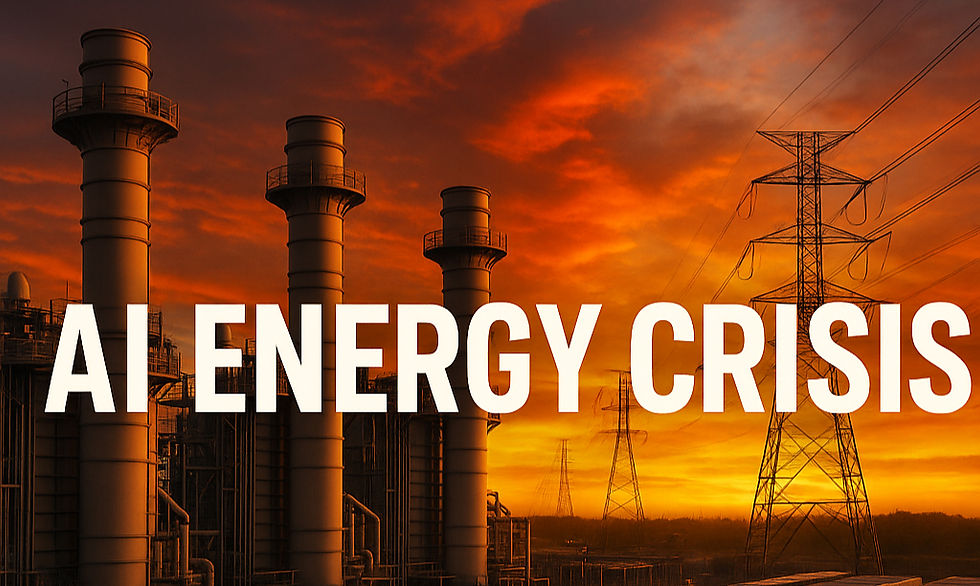AI Boom Sparks Grid Stress — and Only 47 Turbines Stood Between You and a 5-Year Wait
- DPS

- Jun 27, 2025
- 2 min read


Generative AI isn’t just reshaping software—it’s reshaping power systems worldwide. One ChatGPT query can consume 10× the energy of a standard Google search. AI-driven data center growth is pushing peak power demand beyond grid capabilities, especially in high-growth corridors like Dallas–Fort Worth and Northern Virginia.
Texas: The Frontier of the AI Energy Crisis
Record summer demand: ERCOT predicts peak demand could reach 87,500 MW in summer 2025—surpassing last year's 85,464 MW high—driven largely by residential AC and booming data center loads (perceptive-power.com, enchantedrock.com, axios.com).
Grid strain in Dallas: Reports indicate the state is already “on track to set a new peak”, with data centers cited as the fastest-growing energy demand segment (axios.com).
Brownouts and mitigations: Dallas utilities are imposing emergency alerts during peak hours. Some data centers participate in load-shedding, shutting generators to relieve the grid (dallasobserver.com).
Twice the demand incoming: Texas’ main grid operator forecasts statewide demand to nearly double by 2030, fueled by massive “plug-in” requests—136 GW pending, up from 41 GW in just a year (renewableenergyworld.com). Dallas–Fort Worth alone has 141 data centers, leasing 591 MW—second-highest in the U.S. (renewableenergyworld.com).
Amarillo: Building a Hypergrid for AI Powering
11 GW “Hypergrid” campus: Rick Perry’s Fermi America and Texas Tech are planning an 18 million ft² campus near Amarillo—powered by a mix of nuclear, gas, solar, and battery storage, with 1 GW online by late 2026 and full 11 GW buildout later (datacenterdynamics.com).
Strategic scale: Positioned atop major pipelines and close to Pantex nuclear site, it promises to be a self-driven energy-data facility, decoupled from ERCOT bottlenecks (abc7amarillo.com).
Why This Matters for Your AI Infrastructure
Immediate need + limited supply: With only 47 natural gas turbines (30–450 MW) globally available via Data Power Supply’s network, this is a fleeting window—once they’re gone, GE or Siemens backlogs push lead times to 3–5 years.
Avoid the queue—and the risk: Once turbines are claimed, you'll be locked into a queue, while competitors build hypergrid campuses or retrofit onsite power (like Vantage and OpenAI’s modular solutions).
How This Fits With Broader Grid Challenges & Solutions
Problem | Data & Sources | Strategic Implication |
Peak Demand | ERCOT’s forecasted summer peak of 87,500 MW, near 2023’s record (axios.com). | Algeria-scale shortfalls are a public safety risk. |
Connection Delays | 136 GW queued vs. just 41 GW a year ago . | Connection requests needing years to clear stymie growth. |
Transmission Bottlenecks | Dallas brownouts & load-shedding programs to throttle consumption . | Scaling via grid upgrades brings public backlash & delays. |
National nuke resurgence | Texas building 11 GW hybrid campus; micro-reactors, modular gas plants planned . | Data centers are shifting to self-sourcing power. |
Your Zero-Regret Power Move: Act While It's Available
Lock in your turbine now — 47 units left before global shortage.
Avoid 3–5 year OEM wait times that will throttle your time-to-market.
Protect against brownouts and blackouts by owning your dedicated capacity.
Get ahead of the curve as grid upgrades move slow and zones tighten access.
Bottom Line
The AI energy surge is real and it’s here—especially in power-hungry corridors like Dallas-Fort Worth. Unless you're securing power now, you're waiting in line behind hypergrid campuses and nationwide grid delays.
Act fast. Every turbine counts.
Ready to secure power and leapfrog the queue? Contact Data Power Supply today.




Comments